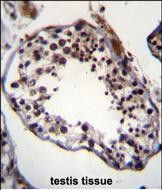TRIM69 Antibody (N-term)
Affinity Purified Rabbit Polyclonal Antibody (Pab)
- 产品详情
- 实验流程
- 背景知识
Application
| WB, IHC-P, E |
|---|---|
| Primary Accession | Q86WT6 |
| Other Accession | Q5BK82, NP_542783.2, NP_892030.3 |
| Reactivity | Mouse |
| Predicted | Rat |
| Host | Rabbit |
| Clonality | Polyclonal |
| Isotype | Rabbit IgG |
| Calculated MW | 57419 Da |
| Antigen Region | 101-129 aa |
| Gene ID | 140691 |
|---|---|
| Other Names | E3 ubiquitin-protein ligase TRIM69, 632-, RFP-like domain-containing protein trimless, RING finger protein 36, Tripartite motif-containing protein 69, TRIM69, RNF36 |
| Target/Specificity | This TRIM69 antibody is generated from rabbits immunized with a KLH conjugated synthetic peptide between 101-129 amino acids from the N-terminal region of human TRIM69. |
| Dilution | WB~~1:1000 IHC-P~~1:100~500 E~~Use at an assay dependent concentration. |
| Format | Purified polyclonal antibody supplied in PBS with 0.09% (W/V) sodium azide. This antibody is purified through a protein A column, followed by peptide affinity purification. |
| Storage | Maintain refrigerated at 2-8°C for up to 2 weeks. For long term storage store at -20°C in small aliquots to prevent freeze-thaw cycles. |
| Precautions | TRIM69 Antibody (N-term) is for research use only and not for use in diagnostic or therapeutic procedures. |
| Name | TRIM69 |
|---|---|
| Synonyms | RNF36 |
| Function | E3 ubiquitin ligase that plays an important role in antiviral immunity by restricting different viral infections including dengue virus or vesicular stomatitis indiana virus (PubMed:23131556, PubMed:30142214, PubMed:31375575, PubMed:31578292). Ubiquitinates viral proteins such as dengue virus NS3 thereby limiting infection (PubMed:30844644). In addition, acts as a key mediator of type I interferon induced microtubule stabilization by directly associating to microtubules independently of its E3 ligase activity (PubMed:36251989). Also plays a role in cataract formation together with TP53 (PubMed:30844644). Mechanistically, inhibits UVB-induced cell apoptosis and reactive oxygen species (ROS) production by inducing TP53 ubiquitination (PubMed:30844644). Regulates centrosome dynamics and mitotic progression by ubiquitinating STK3/MST2; leading to its redistribution to the perinuclear cytoskeleton and subsequent phosphorylation by PLK1 (PubMed:37739411). |
| Cellular Location | Cytoplasm. Nucleus. Nucleus speckle. Cytoplasm, cytoskeleton, microtubule organizing center, centrosome Note=Adopts a filamentous distribution in the cell cytoplasm where it strongly colocalizes with stable microtubules |
For Research Use Only. Not For Use In Diagnostic Procedures.
Provided below are standard protocols that you may find useful for product applications.
BACKGROUND
This gene encodes a member of the RING-B-box-coiled-coil (RBCC) family and encodes a protein with an N-terminal RING finger motif, a PRY domain and a C-terminal SPRY domain. The mouse ortholog of this gene is specifically expressed in germ cells at the round spermatid stages during spermatogenesis and, when overexpressed, induces apoptosis. Alternatively spliced transcript variants encoding distinct isoforms have been described. It may play a role in apoptosis (By similarity).
REFERENCES
Shimada, M., et al. Hum. Genet. 128(4):433-441(2010)
Rose, J.E., et al. Mol. Med. 16 (7-8), 247-253 (2010) :
Shyu, H.W., et al. Exp. Cell Res. 287(2):301-313(2003)
Shyu, H.W., et al. Mech. Dev. 108 (1-2), 213-216 (2001) :
Venter, J.C., et al. Science 291(5507):1304-1351(2001)
终于等到您。ABCEPTA(百远生物)抗体产品。
点击下方“我要评价 ”按钮提交您的反馈信息,您的反馈和评价是我们最宝贵的财富之一,
我们将在1-3个工作日内处理您的反馈信息。
如有疑问,联系:0512-88856768 tech-china@abcepta.com.























 癌症的基本特征包括细胞增殖、血管生成、迁移、凋亡逃避机制和细胞永生等。找到癌症发生过程中这些通路的关键标记物和对应的抗体用于检测至关重要。
癌症的基本特征包括细胞增殖、血管生成、迁移、凋亡逃避机制和细胞永生等。找到癌症发生过程中这些通路的关键标记物和对应的抗体用于检测至关重要。 为您推荐一个泛素化位点预测神器——泛素化分析工具,可以为您的蛋白的泛素化位点作出预测和评分。
为您推荐一个泛素化位点预测神器——泛素化分析工具,可以为您的蛋白的泛素化位点作出预测和评分。 细胞自噬受体图形绘图工具为你的蛋白的细胞受体结合位点作出预测和评分,识别结合到自噬通路中的蛋白是非常重要的,便于让我们理解自噬在正常生理、病理过程中的作用,如发育、细胞分化、神经退化性疾病、压力条件下、感染和癌症。
细胞自噬受体图形绘图工具为你的蛋白的细胞受体结合位点作出预测和评分,识别结合到自噬通路中的蛋白是非常重要的,便于让我们理解自噬在正常生理、病理过程中的作用,如发育、细胞分化、神经退化性疾病、压力条件下、感染和癌症。







